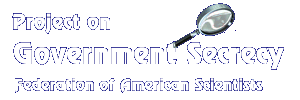 FAS |
Secrecy | 2005 News ||
Search |
Join FAS
FAS |
Secrecy | 2005 News ||
Search |
Join FAS

 |
|
|

Secrecy and Security News
Newer News: February 2005
January 2005
- In Control by Lori Robertson, American Journalism Review, December/January 2005. "The Bush administration has perfected the art of tightly controlling information. And it has paid no price for its disciplined, on-message, my-way-or-the-highway approach. The press might want to get used to it--this may be the template for future presidencies."
- Open Letter to NGA Opposing Withdrawal of Aeronautical Information from Public Domain from Scott R. McEathron, January 28. "I urge you to recognize and exploit the informal collaboration that is already happening between government, industry and higher education in the production, analysis and distribution of geospatial intelligence (GEOINT)."
- Report outlines options for protecting planes from laser weapons by Chris Strohm, Government Executive Daily Briefing, January 28. "A new congressional report concludes that it is 'highly unlikely' that an airliner could be downed by a handheld laser, but outlines several options for policymakers to consider for reducing risks."
- Transportation Department classifies many public documents by Lance Gay, Scripps Howard News Service, January 26. "Transportation Secretary Norman Mineta is giving broad new authority to agency officials to classify previously public documents and withhold them from any public scrutiny."
- Energy Dept to Impose Civil Penalties for Classified Info Security Violations, Federal Register, January 26. A new rule "makes DOE contractors and their subcontractors subject to civil penalties for violations of DOE rules, regulations and orders regarding the safeguarding and security of Restricted Data and other classified information."
- DOE Denies Release of Highly Enriched Uranium History Study, January 24. "While the information contained in the report is not classified, it is sensitive."
- Commandos Get Duty on U.S. Soil by Eric Schmitt, New York Times, January 23. "These commandos, operating under a secret counterterrorism program code-named Power Geyser, were mentioned publicly for the first time this week on a Web site for a new book, 'Code Names: Deciphering U.S. Military Plans, Programs and Operation in the 9/11 World,' (Steerforth Press). The book was written by William M. Arkin, a former intelligence analyst for the Army."
- DOE weighs random polygraph tests for employees by Mike Nartker, Global Security Newswire, January 19. "The proposed regulations would also result in a dramatic reduction in the number of employees who would be subject to mandatory screening, from potentially 20,000 to about 4,500, according to the Energy Department."
- (Dept. of Ironies) CRS: Access My A**, www.ericumansky.com, January 19. "The Congressional Research Service puts out loads of well-researched, non-partisan reports on just about everything under the sun. It's the kind of work a healthy democracy is made of ... and all off-limits to you."
- Transportation Dept Expands Authority to Designate Sensitive Security Information, Federal Register, January 18. "The Secretary is delegating to the Administrators of all Department of Transportation (DOT) agencies, the General Counsel, and the Director of Intelligence and Security the Secretary's authority to determine that information is Sensitive Security Information and available only under prescribed circumstances."
- Agency drops nondisclosure rule for workers by Audrey Hudson, Washington Times, January 18. "Homeland Security Department employees no longer must sign an agreement that bans them from disclosing unclassified information on matters such as security plans or technology, according to a new directive."
- A First Amendment primer for Gonzales by Marc R. Masferrer, Lufkin Daily News, January 14. "Maybe Gonzales will be different if only he receives, courtesy of the Freedom Forum's 2005 First Amendment calendar, a primer on the First Amendment, which sets the standard for the relationship between government and the governed in America."
- The Future of Lying by Chris Summers, BBC News, January 14. "The US Department of Defense has given Dr Jennifer Vendemia a $5m grant to work on her theory that by monitoring brainwaves she can detect whether someone is lying."
- Homeland Security reverses secrecy policy, but protests persist by Chris Strohm, GovExec.com Daily Briefing, January 12. "On Tuesday, DHS reversed a policy that required all employees to sign an oath that they will not disclose certain information without proper authorization, including material labeled as sensitive but unclassified."
- Spy vs. CIA: It's a shot in the dark by Bill Adair, St. Petersburg Times, January 10. "Can a secret agent sue to enforce a contract he agreed to keep secret? The U.S. Supreme Court will hear arguments."
- For the Army, the ABCAs of Jargon by Christopher Lee, Washington Post, January 7. "Military jargon is, famously, an alphabet soup of abbreviations. Now the Department of the Army (DA) has issued guidance telling its soldiers and civilian employees how to mix the ingredients."
- DOE Proposes Revised Polygraph Regulations, Federal Register, January 7. "The main
features of today's supplemental proposal are: Significant reductions in the number of individuals now subject to mandatory counterintelligence evaluations including polygraph screening."
- Protection of Sensitive Security Information, Federal Register, January 7. "OST and TSA are revising their regulations governing the protection of sensitive security information (SSI) to remove an unintended limitation on parties that have a need to know such information."
- Anatomy of a Spy Satellite by Leonard David, Space.com, January 3. "There is now a delicate dance underway between issues of national security and open public scrutiny about taxpayer dollars being spent wisely or squandered. Meanwhile, the swirl of secrecy seems to be revolving around a top secret 'stealthy' satellite project, codenamed MISTY."
Older News: December 2004
 FAS |
Secrecy |
2005 News ||
Search |
Join FAS
FAS |
Secrecy |
2005 News ||
Search |
Join FAS
 http://www.fas.org/sgp/news/2005/01/index.html
http://www.fas.org/sgp/news/2005/01/index.html
 Maintained by Steven Aftergood
Maintained by Steven Aftergood



